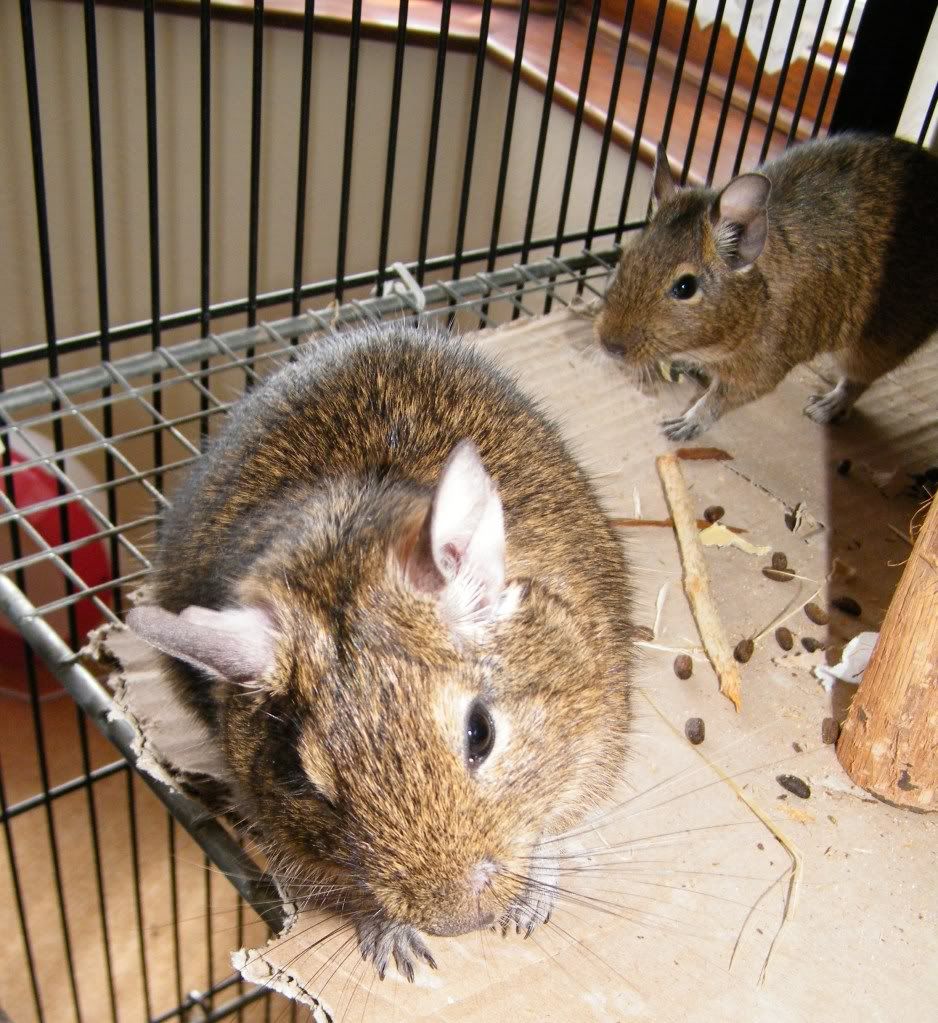Post by moletteuk on Apr 17, 2012 14:53:17 GMT
Choosing a Vet
It is essential to be able to provide your degus with veterinary care, and it is important to find a suitable vet in advance of needing one. In some areas of the world it is necessary to find out whether degu vet care is available to you as this may influence your decision whether degus are right for you. You can choose a vet by asking for recommendations on the internet or perhaps from local small animal rescue services, or you may have to phone several vets and ask them about their degu experience. Sometimes it can be preferable to locate a vet close to you for routine examination and procedures but seek the services of a more specialised exotics vet for more unusual problems, your regular vet may even advise and assist in seeking a referral to a specialist.
Sometimes it is not possible to locate a vet with good degu experience, or you may need to use your judgement on the competence of the vet with degus. In these cases you may wish to take into account the vet's level of interest in your degus, the degree of care shown and willingness to do research, and general handling of the degus. As degus sometimes require non-standard medication doses, it can be worth double checking medication concentrations and dosages.
There can be wide variation in the cost of a degu consultation, so it can be useful to ask in advance what the standard fee is. As degu health insurance is not usually available or cost effective, you may wish to consider saving up you own vet care fund.
You may also wish to investigate what out-of-hours vet service is available in your area, so you are prepared in case of emergency.
Taking your Degu to the Vet
As soon as you notice your degu is sick or injured, you need to observe the degu as closely as possible in order to gather as much information as you can that could be relevant and useful to the vet. What does your degu look like - is he quiet, withdrawn, fur all fluffed up and big, teeth chattering? Is there any new behaviour, like aggression, limping, change in eating or drinking habits, fussing at body part, extra sleeping? Is there an absence of normal behaviours, like running, playing, socialising? Are there any strange smells? - eg bad smell from infection; metallic smell from blood. Make sure you tell the vet all your observations clearly, it can help to take notes, also ask the vet to explain things to you as necessary.
For the trip to the vet, you need a secure carrier. They are available in wire or plastic construction or you can make a wooden one, suitability can depend on the chewing tendencies, character, stress, and level of illness of the degu. Wire carriers can be improved by lining with tiles or cardboard, plastic carriers can be improved by providing wood to chew. Equip the carrier with some hay, something to chew on, and a box or towel for the degu to hide in. Food and water should be provided if the trip will take longer than around an hour or if cagemates are present. If the weather is cold or the degu is very sick a heatpad can be very beneficial, they can also help degus to settle in unusual surroundings. A towel should also be included to place over or around the carrier if necessary to reduce stress and fear and protect from weather. You could also place the carrier inside another box for extra security, but bear in mind ventilation. It can also be useful to take a cardboard tube for getting the degu in and out of the carrier.
The carrier should be strapped into the vehicle or held securely and watched as closely as possible. Do not transport in the boot/trunk of a car. Try to keep noise levels low and temperature moderate if possible.
You may wish to consider taking a cagemate with the ill degu for reducing stress and avoiding the sick degu being singled out for smelling strange on reintroduction.
-------------------------------
Please add any vet recommendations to this thread and they will subsequently be added to the chart, please include practice name, address and contact details. You can also leave user views or comments, for example, if one particular vet at the practice covers degus, or what conditions they have experience treating. You can also post information about vets you have not had a positive experience with.
It is essential to be able to provide your degus with veterinary care, and it is important to find a suitable vet in advance of needing one. In some areas of the world it is necessary to find out whether degu vet care is available to you as this may influence your decision whether degus are right for you. You can choose a vet by asking for recommendations on the internet or perhaps from local small animal rescue services, or you may have to phone several vets and ask them about their degu experience. Sometimes it can be preferable to locate a vet close to you for routine examination and procedures but seek the services of a more specialised exotics vet for more unusual problems, your regular vet may even advise and assist in seeking a referral to a specialist.
Sometimes it is not possible to locate a vet with good degu experience, or you may need to use your judgement on the competence of the vet with degus. In these cases you may wish to take into account the vet's level of interest in your degus, the degree of care shown and willingness to do research, and general handling of the degus. As degus sometimes require non-standard medication doses, it can be worth double checking medication concentrations and dosages.
There can be wide variation in the cost of a degu consultation, so it can be useful to ask in advance what the standard fee is. As degu health insurance is not usually available or cost effective, you may wish to consider saving up you own vet care fund.
You may also wish to investigate what out-of-hours vet service is available in your area, so you are prepared in case of emergency.
Taking your Degu to the Vet
As soon as you notice your degu is sick or injured, you need to observe the degu as closely as possible in order to gather as much information as you can that could be relevant and useful to the vet. What does your degu look like - is he quiet, withdrawn, fur all fluffed up and big, teeth chattering? Is there any new behaviour, like aggression, limping, change in eating or drinking habits, fussing at body part, extra sleeping? Is there an absence of normal behaviours, like running, playing, socialising? Are there any strange smells? - eg bad smell from infection; metallic smell from blood. Make sure you tell the vet all your observations clearly, it can help to take notes, also ask the vet to explain things to you as necessary.
For the trip to the vet, you need a secure carrier. They are available in wire or plastic construction or you can make a wooden one, suitability can depend on the chewing tendencies, character, stress, and level of illness of the degu. Wire carriers can be improved by lining with tiles or cardboard, plastic carriers can be improved by providing wood to chew. Equip the carrier with some hay, something to chew on, and a box or towel for the degu to hide in. Food and water should be provided if the trip will take longer than around an hour or if cagemates are present. If the weather is cold or the degu is very sick a heatpad can be very beneficial, they can also help degus to settle in unusual surroundings. A towel should also be included to place over or around the carrier if necessary to reduce stress and fear and protect from weather. You could also place the carrier inside another box for extra security, but bear in mind ventilation. It can also be useful to take a cardboard tube for getting the degu in and out of the carrier.
The carrier should be strapped into the vehicle or held securely and watched as closely as possible. Do not transport in the boot/trunk of a car. Try to keep noise levels low and temperature moderate if possible.
You may wish to consider taking a cagemate with the ill degu for reducing stress and avoiding the sick degu being singled out for smelling strange on reintroduction.
-------------------------------
Please add any vet recommendations to this thread and they will subsequently be added to the chart, please include practice name, address and contact details. You can also leave user views or comments, for example, if one particular vet at the practice covers degus, or what conditions they have experience treating. You can also post information about vets you have not had a positive experience with.









 but a bit pricey.
but a bit pricey. 



 I was chatting on Paw Talk forum and some degu owners in the US and Canada had mentioned vets using light sedation gas rather than GA? Is this possible in the Uk and does anyone use a vet that practices this procedjure?
I was chatting on Paw Talk forum and some degu owners in the US and Canada had mentioned vets using light sedation gas rather than GA? Is this possible in the Uk and does anyone use a vet that practices this procedjure?